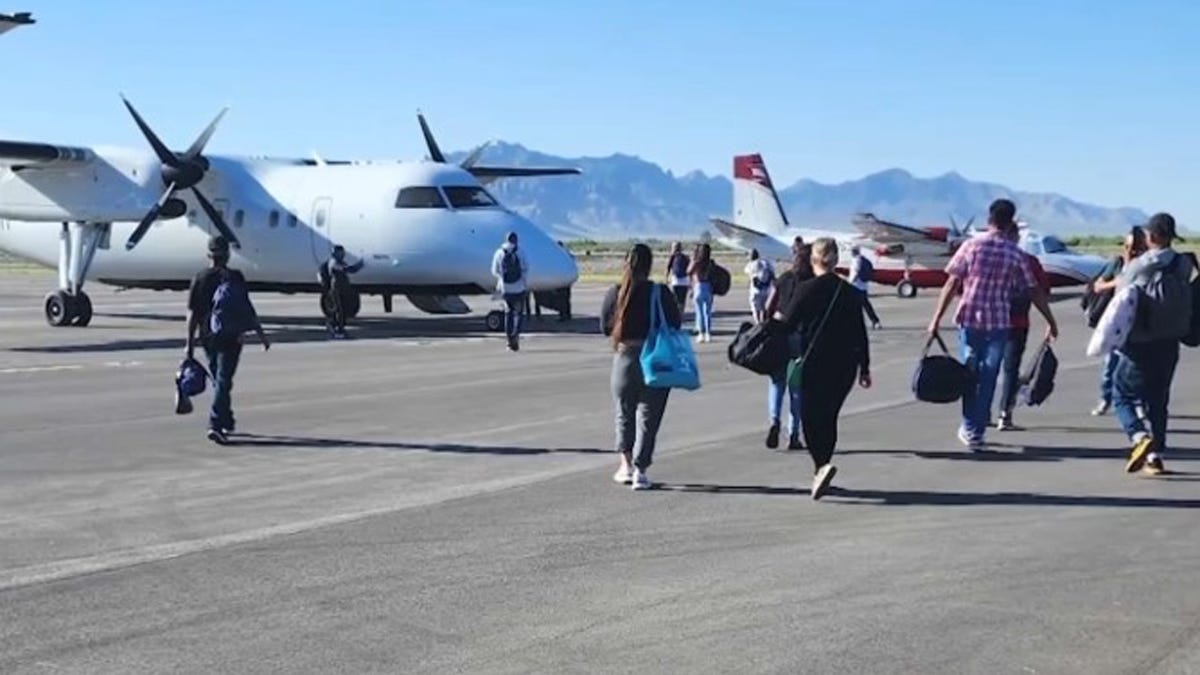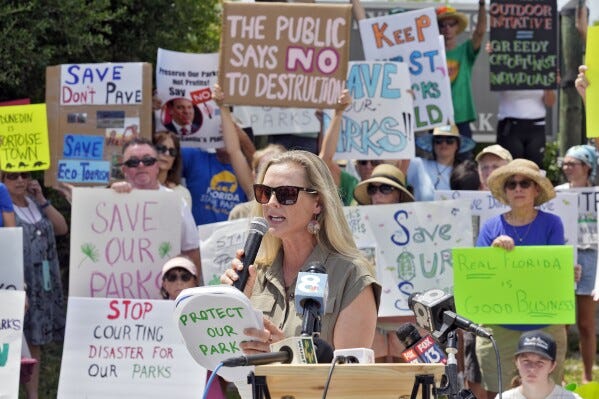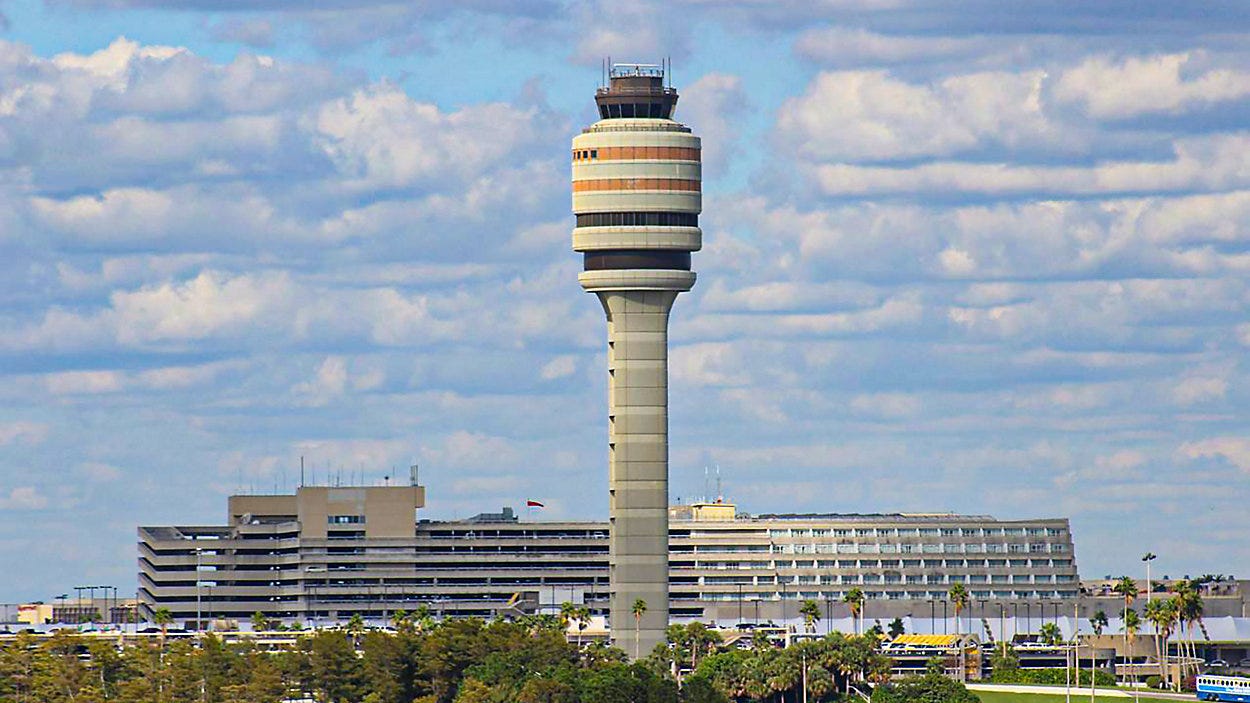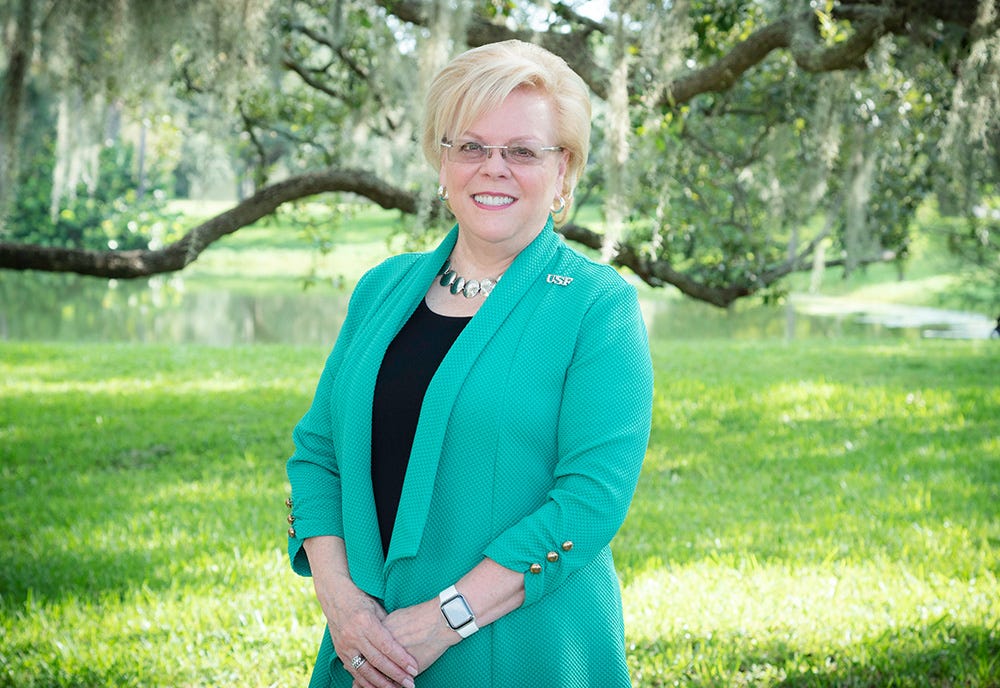Sweeping Immigration Bill Becomes Law & DeSantis' Controversial Migrant Flight Program Set to End
February 20, 2025 — This Week's News from Central Florida
Welcome to this week’s edition of the Central Florida Times, a newsletter about what’s happening across the region — from politics, business, real estate, climate, and more. These are the most important stories you need to know. To never miss an update, subscribe here:
Here’s the latest from Central Florida…
Sweeping Immigration Bill Becomes Law After Governor DeSantis and Lawmakers Reach Deal
Florida lawmakers have passed a sweeping immigration bill, signed into law by Governor Ron DeSantis, aimed at bolstering cooperation between state, local, and federal authorities in enforcing immigration laws. This development follows a previous special session where the Legislature approved the TRUMP Act, which DeSantis threatened to veto for being too “weak,” resulting in a public standoff with legislative leaders. Despite the bitter feud, House Speaker Daniel Perez (R-Miami) and Senate President Ben Albritton (R-Wauchula) reached a compromise that gave Governor DeSantis most of what he originally proposed in a strict immigration bill.
The new law creates a State Board of Immigration Enforcement, comprising the Governor, Agriculture Commissioner, Attorney General, and CFO, to oversee immigration enforcement in the state. This change removes a proposal in the TRUMP Act that placed Agriculture Commissioner Wilton Simpson with exclusive oversight of immigration matters but was met with sharp criticism from DeSantis. It also establishes state-level crimes for illegal immigrants, enhances criminal penalties, and mandates cooperation between state and local law enforcement and federal authorities.
Some key provisions include:
State Board of Immigration Enforcement: A new board to oversee immigration enforcement, with the governor as chairman. All decisions must be made by a unanimous vote.
Grants for Local Law Enforcement: $250 million in grants to support immigration enforcement efforts.
Tuition Waivers: Eliminates in-state tuition rates for undocumented students, known as “Dreamers,” effective July 1, 2025.
Ends Catch and Release: Denies bail for illegal immigrants accused of committing forcible felonies and mandates detention for such criminals.
State-Level Crimes: Makes it a state-level crime for an illegal immigrant to enter Florida without legal authorization.
Enhanced Penalties: Increases penalties for crimes committed by illegal immigrants, including mandatory death penalties for murder or child rape.
Cooperation with Federal Authorities: Mandates cooperation between state and local law enforcement and federal authorities.
Penalties for Local Officials: Prohibits local officials from adopting non-compliant immigration policies and authorizes the governor to suspend or remove elected representatives from office who are accused of impeding enforcement efforts.
The legislation has been hailed as the "strongest crackdown on illegal immigration in the nation" by legislative leaders. However, critics warn of potential legal challenges to provisions of the bill and economic repercussions, as migrant labor is vital to key industries in Florida.
The bill became effective immediately following the governor’s signature last week.
Controversial Migrant Flight Program Set to End
Florida's contentious migrant flight program will be phased out by 2027 under the newly passed immigration bill. The legislation mandates that all future migrant transportation operations fall under the "direct control and supervision" of U.S. Immigration and Customs Enforcement (ICE), transferring authority from the governor. Just three weeks ago, Governor DeSantis sought greater powers to deport undocumented immigrants, including outside the continental United States, along with $350 million in funding to carry out the task. Under the compromise, Florida may still assist in deporting migrants, but only at ICE’s request, with federal reimbursement for expenses. Senate President Ben Albritton emphasized that the changes reflect the understanding that immigration enforcement remains the federal government's primary role. The governor’s office rejected assertions that the changes restrict his authority, claiming that the Unauthorized Alien Transportation Program expands the governor’s ability to transport illegal immigrants outside the country versus sending them to sanctuary jurisdictions. Some Republican lawmakers, including bill sponsor Sen. Joe Gruters (R-Sarasota), suggested the program was no longer needed under the Trump administration. Others criticized the high cost of the program, which amounted to millions of dollars spent in state contracts for two charter flights carried out in 2022 and 2023.
Lawmakers Advance Bill to Shield State Parks from Development
A Florida Senate committee unanimously approved a bill Tuesday that would prohibit golf courses, pickleball courts, hotels, and other non-conservation development on state park land. The bipartisan measure follows fierce public outcry last summer after the DeSantis administration’s “Great Outdoors Initiative” revealed state plans to construct active recreational facilities at several parks, potentially harming environmentally sensitive habitats. Sen. Gayle Harrel (R-Stuart), the bill’s sponsor, emphasized the importance of preserving parks for public enjoyment and conservation. SB 80 would ban projects unrelated to activities like hiking, camping, and canoeing while also increasing public notice for proposed changes to 30 days. A coalition of 70 organizations and environmental groups praised the bill but urged lawmakers to extend protections to state forests and wildlife areas. Sen. Blaise Ingoglia (R-Spring Hill), a DeSantis ally, backed the measure, saying it provides necessary “guardrails” to preserve Florida’s unique natural resources. The bill must clear two more Senate committees and receive approval from the full Senate and House before going to Governor DeSantis’ desk. If passed, it will also require a maintenance report on state park infrastructure by December 2025.
Florida School Voucher Program Rapidly Grows as Wealthy Families Benefit
Florida’s school voucher program has expanded dramatically since income requirements were eliminated in 2023, with participation increasing by 67%. Once reserved for low-income students and those with disabilities, the program now serves families at all income levels, directing an estimated $3.4 billion in public funds to private schools, many of which are religious. Critics argue that the expanded program primarily benefits wealthier families who were already affording private education. Over 70% of students enrolled in private schools are utilizing state-funded scholarships, with some high-cost tuition schools seeing state funding surge from thousands to millions. About 40% of these students did not previously qualify for vouchers because their household income exceeded program thresholds. At St. Margaret Mary Catholic School in Winter Park–one of Central Florida’s wealthiest communities–98% of students used the $8,000 per student taxpayer-funded vouchers last year. Only three percent of students at St. Margaret Mary’s either qualified or received financial aid in the year before the program expanded. An analysis by the Orlando Sentinel found that private schools with annual tuition of at least $15,000 grew by 30,000 voucher students last year. Meanwhile, public schools face financial losses as students transition to private institutions. More than 500,000 students are now participating in Florida’s school choice scholarship program since Gov. DeSantis signed HB 1 (2023) into law in March 2023, which expanded school choice by eliminating financial eligibility restrictions and the enrollment cap for vouchers. Supporters of the expansion say it provides greater access to high-quality education that is tailored to fit student’s individual needs. However, concerns remain over accountability, as private schools receiving public funds are not required to meet the same academic, curriculum, and hiring standards as public institutions. Florida’s education voucher system is the largest in the nation; in fact, 10% of all K-12 students in the state are now receiving the taxpayer subsidy.
Florida Bill Seeks to Rename ‘Gulf of Mexico’ to ‘Gulf of America’
A proposed bill in Florida aims to replace all references to the “Gulf of Mexico” in state laws with “Gulf of America,” following an executive order from former President Donald Trump. Filed by State Sen. Nick DiCeglie (R-Indian Rocks Beach) the 70-page bill (SB 608) is set for discussion in the upcoming legislative session beginning March 4. Gov. Ron DeSantis has already embraced the name change in official statements, but state laws still refer to the Gulf of Mexico in multiple sections, including boundary descriptions and environmental regulations. If passed, the changes would take effect on July 1, 2025.
National Hurricane Center Adopts ‘Gulf of America’ Name Change
The National Hurricane Center has officially replaced “Gulf of Mexico” with “Gulf of America” on its website, aligning with former President Donald Trump’s executive order. The update appears in the Atlantic basin map and a recent tropical outlook, which referenced a “Gulf of America Gale Warning.” While U.S. agencies are making the switch, other nations, including Mexico, have not adopted the new designation. Some older references remain on the site.
Orlando Air Traffic Control Facility in Need of Major Upgrade
A critical air traffic control center at Orlando International Airport (MCO) urgently needs modernization, with officials warning that outdated equipment and infrastructure could impact flight safety and efficiency. The Central Florida Terminal Radar Approach Control facility, or TRACON, has not been fully upgraded since its construction in 1983, despite Orlando International ranking as Florida’s busiest airport. Local lawmakers, including Congressman Darren Soto (D-Kissimmee), are urging the Federal Aviation Administration (FAA) to move forward with a proposed $60 million upgrade. The 2021 Infrastructure Investment and Jobs Act allocated $5 billion for such upgrades nationwide, with Orlando's TRACON among 52 facilities identified for potential replacement. The FAA will review the initial design analysis when completed, but the agency has not indicated whether approval will granted or what a timeline for construction would look like. TRACON handles flights within a 30- to 50-mile radius, supporting Orlando International and smaller regional airports, which together serve more than 58 million passengers annually. Aviation safety advocates stress that increasing air traffic could lead to longer delays and operational challenges amid the region's explosive growth without modernization. Orlando International Airport (MCO) ranked as the second-worst airport in the nation for on-time flights in 2023, according to FlightAware.
Florida Officials Warn Asphalt Shingle Roofs Lose Wind Resistance After a Decade
Asphalt shingles are the most common roofing material used across the nation, including in hurricane-prone Florida, but now the state Insurance Commissioner is warning homeowners that they lose their ability to withstand hurricane-force winds after just 10 years–far earlier than manufacturers have long promised. According to Commissioner Michael Yaworsky, degradation from the sun weakens the petroleum-based shingles, reducing their ability to withstand hurricane-force winds. This contradicts manufacturer claims that asphalt shingle roofs can last up to 30 years. Speaking before the Senate Banking and Insurance Committee, he highlighted findings from a June report by Applied Research Associates Inc., which revealed that the average life of an asphalt shingle roof with hurricane-resistant capabilities is only 10 years. The report, citing damage from hurricanes Ian, Michael, and Irma, found that older shingles are more prone to wind uplift and cohesion failure in their sealant. It also noted that roofs over six years old show higher failure probabilities in high winds. Despite the widespread use of asphalt shingles as the predominant roofing material for its relative affordability, Yaworsky suggested incentivizing more durable options, such as metal roofs, through insurance discounts. Metal roofs can last 30-50 years and provide better protection against hurricanes and wildfires. However, the higher costs associated with these alternatives can be cost-prohibitive for many homeowners. However, some industry representatives defend the use of newer asphalt shingles installed under current building codes, citing improvements in quality and installation. Testing continues on newer materials like composite tile to evaluate long-term resilience.
St. Petersburg Pushes for Statewide Crane Safety Standards
St. Petersburg officials are urging the Florida Legislature to repeal a law preventing local crane regulations and establish uniform statewide safety standards. The push for new crane safety standards follows the collapse of a construction crane during Hurricane Milton in downtown St. Pete. The crane crashed into an office building, causing significant damage, and has sparked concerns about public safety and the lack of local authority over crane regulations. The City Council will vote on a resolution asking state lawmakers to take action. City leaders discussed possible reforms, including requiring contractors to disclose crane specifications before construction begins. While this information would be voluntary, officials believe most developers would comply. Additionally, the city plans to enhance public notifications, issuing warnings to residents in a crane fall zone at the start of hurricane season rather than just before a storm. St. Petersburg Democratic lawmakers Sen. Darryl Rouson and Rep. Lindsay Cross have introduced legislation that reverses provisions of the state preemption on crane regulation.
Tampa Bay Rays Accuse St. Petersburg, Pinellas County of Violating Stadium Deal
Tampa Bay Rays presidents Matt Silverman and Brian Auld are holding Pinellas County and St. Petersburg responsible for uncertainty over the team’s future, citing past, now-resolved delays on financing votes and repairs to Tropicana Field. Speaking on a team-produced radio show last week, Silverman said, “They effectively broke the deal and turned their back on the commitment they made to us in August.” The county’s postponement of an October vote on stadium financing, he claimed, derailed the project by pushing construction back a year and increasing costs beyond what the team can afford. St. Petersburg Mayor Ken Welch and Pinellas County leaders are pushing back against Rays’ executive’s criticisms of their actions. St. Petersburg Mayor Ken Welch defended the city’s commitment to the baseball club, saying local officials acted in good faith throughout negotiations and emphasized that the Rays had agreed to cover any cost overruns with the stadium. “We’re just asking them to keep their word and their promises to our community,” Welch added. He also reaffirmed that the city won’t allocate additional public funds beyond the agreed $300 million. County leaders also dispute that the two-month delay on a public financing vote significantly impacted the stadium project timeline or budget. The team’s executives also accused the City of St. Petersburg of failing to meet its contractual obligations to maintain Tropicana Field, but Rays officials originally urged the city council to reject spending multiple millions on stadium repairs. The Rays have until March 31 to decide whether to proceed with the agreement for a new $1.3 billion stadium and the redevelopment of the surrounding Historic Gas Plant District.
Tampa Bay Rents Drop 8%, Affordability Remains a Challenge
Rent prices in the Tampa Bay area have fallen 8% year over year, marking one of the most significant drops in the country, according to a new report from Redfin. Despite this decline, many renters are still struggling to afford housing as prices remain nearly 30% higher than in 2020. The median rent now stands at $1,729, the lowest since October 2021. However, a wage gap persists, with the typical renter earning just under $55,000, well below the estimated $69,400 needed to afford local rent. Experts cite increased housing supply as a key factor in the price dip, but warn that high interest rates could slow future development, potentially causing rents to climb again.
DeSantis Proposes Ban on Random Boating Stops Without Suspicion
Gov. Ron DeSantis is pushing for new legislation to prevent marine law enforcement officers from stopping boats for inspections without reasonable suspicion of a crime. Speaking at the Miami International Boat Show, he introduced a “boater freedom initiative” aimed at reducing what he described as unnecessary interference with recreational boaters. Under current Florida law, officers can stop vessels for routine safety checks, inspecting registrations, fishing licenses, and safety equipment. Authorities can stop and conduct inspections of boats and passengers without probable cause, which can also result in checking a boater’s sobriety. DeSantis argued this leads to unwarranted searches, citing a viral case of a man arrested despite passing a Breathalyzer test. The proposed change will likely be taken up in the upcoming legislative session and would significantly alter maritime enforcement but leaves questions about its impact on U.S. Coast Guard operations.
Disney Faces Class Action Lawsuit Over Changes to Disability Access Service
Walt Disney Parks and Resorts is facing a class-action lawsuit that alleges recent changes to its Disability Access Service (DAS) violate privacy rights and equal access laws. In April 2024, Disney restricted DAS eligibility to guests with developmental disabilities like autism, citing an unsustainable increase in requests that resulted in potential abuse of the service. DAS permitted registered guests with disabilities to experience park attractions by allowing them to wait outside of the regular queue for the duration of the posted wait time. After this period, guests could access an expedited line to enter the ride, minimizing the time spent in crowded areas. We previously covered the backlash regarding Disney's changes to the Disability Access Service in a previous edition of the newsletter. The recent lawsuit, filed by a California resident, argues the stricter eligibility requirements unlawfully exclude individuals with physical impairments who cannot wait in conventional attraction queues. The complaint also alleges that Disney's application process forces guests to disclose private medical information in public settings. Additionally, the suit claims that Disney's alternative accommodations fail to provide equitable access and impose undue burdens on disabled guests. The lawsuit seeks to compel Disney to revise its DAS policies across all theme parks.
USF President Rhea Law Announces Retirement
University of South Florida (USF) President Rhea Law has announced her retirement, prompting the institution to launch a national search for her successor. Law, 75, who has held the presidency since August 2021, initially served on an interim basis before officially taking the helm in March 2022. In a message to the USF community, she reflected on the university’s progress, crediting faculty, staff, and students for surpassing ambitious goals. Under Law’s leadership, USF achieved a major milestone by joining the prestigious Association of American Universities in 2023 and consistently ranked among the top 50 public universities in the U.S. by U.S. News & World Report. The university also saw record-breaking research funding, student applications, and philanthropic contributions during her tenure. Law’s legacy will include the new on-campus football stadium that broke ground in November 2024 and is scheduled to open ahead of the 2027 football season. Law will step down once a new president is selected.
Trump Shares Poll Touting Byron Donalds As Leader in Florida Governor Race
Former President Donald Trump on Monday shared a poll indicating that U.S. Representative Byron Donalds (R-Naples) holds a strong lead in a hypothetical Florida gubernatorial primary. The survey, conducted by Victory Polling among 850 likely Republican primary voters at the end of January, shows Donalds with 31% support, well ahead of Lt. Gov. Jeanette Nuñez (4%), Agriculture Commissioner Wilton Simpson (3%), and Miami Mayor Francis Suarez (1%). Other notable potential challengers such as former Congressman Matt Gaetz and Gov. DeSantis’ wife, Casey DeSantis, were absent from the poll. Importantly, 60% of voters remain undecided. While Donalds has not officially announced a campaign, reports suggest he has told donors he plans to run. Trump’s post, which was short of a formal endorsement also listed notable supporters backing Donalds, quickly gaining traction on Truth Social. President Trump and Donalds have shared a close relationship, with the Florida congressman serving as a national campaign surrogate during Trump’s successful reelection bid. An endorsement from the Republican president could significantly boost Donalds' prospects and force other rumored GOP contenders to stay out of the race. However, with the August 2026 primary nearly 18 months away, the race remains fluid.
DeSantis: Casey DeSantis is Not Running for Governor
Governor Ron DeSantis attempted to quash rumors about his wife Casey's potential gubernatorial bid for 2026 during a recent Fox News interview. Despite widespread speculation and previous polling showing strong support for Casey among Republican voters, DeSantis stated, "It's not something that she's seeking out." The governor acknowledged the flattering nature of the public interest but emphasized that his wife is not actively pursuing a political career. He praised Casey's role as a mother and her inspirational battle against cancer, describing her as "even more conservative" than himself.
Norwegian Cruise Line Unveils Plans for Massive New Ships
Norwegian Cruise Line has officially ordered four massive vessels as part of its new Pinnacle class, set to compete with Royal Caribbean’s largest ships. Italian shipbuilder Fincantieri confirmed the order, with deliveries scheduled for 2030, 2032, 2034, and 2036. Each ship will measure 226,000 gross tons and accommodate over 8,300 passengers and crew, making them some of the largest cruise ships in the world. The ships will be built at Fincantieri’s Monfalcone shipyard in Italy and will incorporate advanced sustainability features. This expansion follows Norwegian’s Prima and Prima Plus class ships, with the upcoming Norwegian Aqua launching later this year. While Royal Caribbean and MSC currently dominate the ultra-large ship market, Norwegian’s new class signals a major shift in competition for mega-cruise experiences.
Temple Terrace Unveils Riverside Park Revitalization Plans
Temple Terrace residents recently got their first glimpse of the proposed $5 million expansion of Riverside Park, a project that will merge the existing park with adjacent undeveloped land and Springdale Pond. Key features of the 9-acre park include a new fishing pier, kayak launch, 20-foot observation tower, and a boardwalk along the Hillsborough River. The design also incorporates a large open lawn with a pavilion for gatherings and enhanced connectivity to the city's downtown area to improve accessibility and walkability. While residents were supportive of the project, concerns were raised about parking capacity and bathroom facilities. City officials emphasized the park's intended role as a passive community space rather than a regional attraction. The project, still in its early stages, is set to begin construction in 2026, pending final approvals and community feedback.
St. Pete Pier’s ‘Bending Arc’ Sculpture Removed for Repairs
The “Bending Arc” sculpture at the St. Pete Pier is coming down as caretakers assess how to reinforce it against storm damage. The aerial net sculpture by artist Janet Echelman has sustained damage from three storms since its installation four years ago. Former Mayor Rick Kriseman secured $1.25 million in private funds for the artwork, along with an additional $400,000 for its foundation, lighting, and support pylons. Despite its lightweight appearance, the sculpture was designed to withstand winds up to 150 mph. Officials hope to restore and rehang it with improved durability.
Thanks for reading this edition of the Central Florida Times. To never miss an update, subscribe for free:
In the meantime, if you learned something or found this read interesting, please consider sharing it to grow our community!










